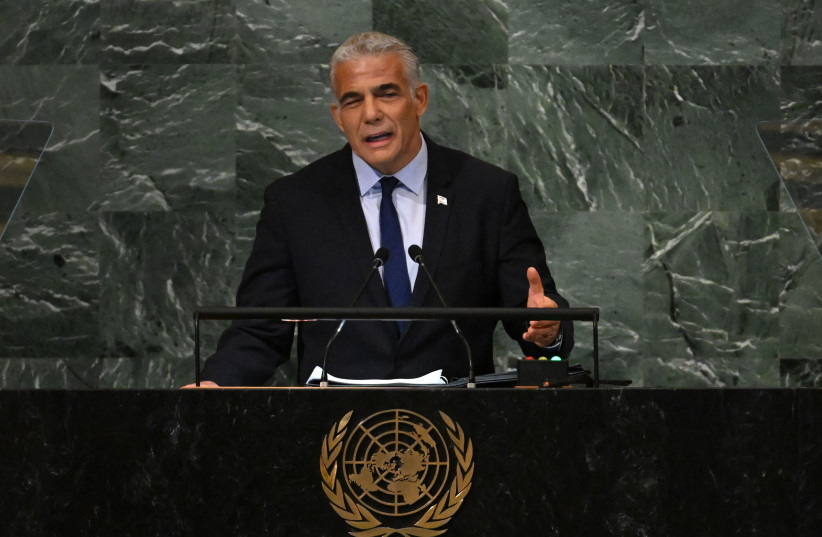Sometimes the most important part of a speech is what is not said.
Prime Minister Yair Lapid’s speech to the UN on Thursday was every bit as tough as prior speeches by Naftali Bennett and Benjamin Netanyahu in that arena.
But the context is different.
We are in or nearer than ever to the end game, and Lapid set no deadline or even any concrete line in the sand.
Much of this cannot be placed at his feet. By the time Lapid became prime minister in July, Iran already had enough uranium enriched to the 60% level to be able to weaponize three nuclear bombs.

It could still take quite a while for the Islamic Republic to figure out how to detonate and deliver these weapons, but make no mistake, Tehran is on a new nuclear threshold it has never occupied in the 25 or so years it has been seeking nuclear weapons.
When Bennett talked tough in 2021 – but failed to give a deadline by which time Israel would act if Iran did not freeze its forward nuclear progress – the threat was nowhere near as severe.
Various top American and Israeli officials have suggested that all hell might break loose if Iran actually crosses the weaponization threshold by jumping from the 60% enriched level to the 90% level.
But there was no sign of that from Lapid on Thursday.
He warned, “If the Iranian regime gets a nuclear weapon, they will use it. The only way to prevent Iran from getting a nuclear weapon is to put a credible military threat on the table. And then – and only then – to negotiate a longer and stronger deal with them.”
Yet, Israel is not doing this right now.
Lapid said emphatically, “We have capabilities and we are not afraid to use them. We will do whatever it takes: Iran will not get a nuclear weapon. We will not stand by while there are those who try to kill us. Not again. Never again.”
But aside from being great oratory, what do these words mean when neither the US nor Israel are setting any specific redlines?
It would seem to mean that there will be no Israel or American attack if Iran passes the 90% threshold.
It would seem to mean that the Mossad and the CIA might continue trying their best to slow things down and jam up the nuclear works, but that Jerusalem and Washington will bet the ayatollahs will need lots of time to master detonation and delivery – and that they will not go that far.
The “they will never go that far” argument was once said about 90% enrichment.
Former Prime Minister Benjamin Netanyahu's UN speech
In a famous UN speech, Netanyahu once drew all kinds of redlines that either have long been blown through or which now look shaky.
One line, once upon a time, was the 20% enrichment level. It was never really said about the 60% enrichment level because the Islamic Republic jumped to that level so quickly in mid-2021 that the world seemed utterly caught off guard.
In fact, Iran pulled this off within days after the Mossad blew up a second nuclear site at Natanz.
This was Tehran’s way of showing that even Israel’s elite spy agency could only slow but not stop its nuclear charge.
After Lapid’s speech, the question remains: Does Israel have any specific redline and what would it be? It seems the almighty 90% threshold line might already have fallen.
